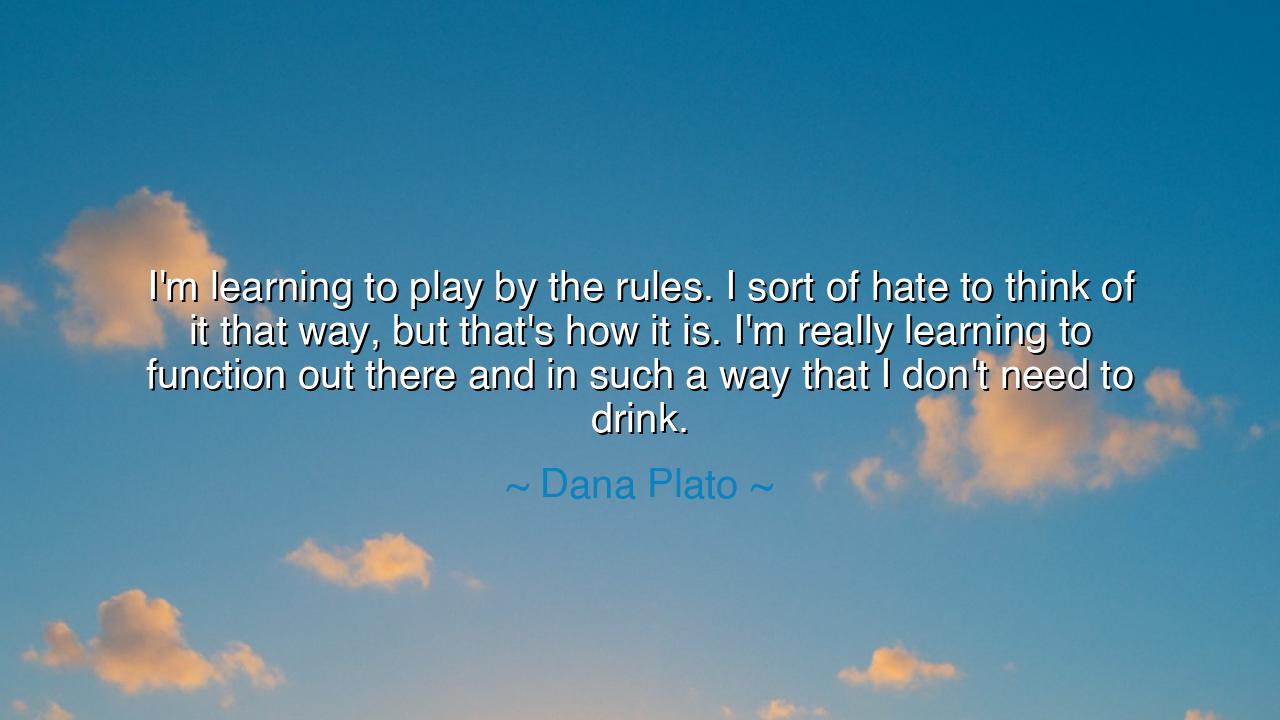
I'm learning to play by the rules. I sort of hate to think of it
I'm learning to play by the rules. I sort of hate to think of it that way, but that's how it is. I'm really learning to function out there and in such a way that I don't need to drink.






Hear the words of Dana Plato, who once confessed with a trembling honesty: “I'm learning to play by the rules. I sort of hate to think of it that way, but that's how it is. I'm really learning to function out there and in such a way that I don't need to drink.” These are not the words of prideful triumph, but of raw struggle, the kind spoken by one who has wrestled with weakness and sought the narrow path toward healing. In her utterance we see both the sting of discipline and the flicker of hope—a recognition that life demands boundaries, and that freedom is not found in indulgence but in the strength to live without chains.
The phrase “play by the rules” speaks of a world that is structured, ordered, sometimes suffocating, yet necessary for survival. To the one who has lived in chaos, the idea of rules feels heavy, even hateful. Yet Plato acknowledges the truth: there is no lasting freedom in lawlessness, no lasting joy in escape. The rules of sobriety, the disciplines of daily life, may feel like shackles at first, but in time they become the guardrails that keep the traveler from falling into the abyss. Thus, what feels like restraint is, in truth, salvation.
Her words about learning to function without drink strike at the heart of one of humanity’s oldest battles: the struggle against self-destruction. From the wine-soaked feasts of the ancients to the opium dens of later centuries, countless souls have sought refuge in substances that promise relief but deliver ruin. To live without drink, for Plato, is not merely abstinence—it is reclamation of self, a rediscovery of one’s own strength, unclouded and unbroken. It is the hero’s task to face the beast within, to slay not a dragon of fire, but the serpent of desire.
Consider the tale of Ulysses and the Lotus-Eaters, when the weary sailors tasted the fruit that made them forget their home, their duty, and their future. The sweetness numbed their pain, but it stole their will. Only the stern resolve of Ulysses pulled them back to their journey. So too with Plato’s confession: to drink is to surrender to forgetfulness, to wander aimlessly in false comfort. To resist is to choose the harder path—the path that leads home to one’s true self.
In her hatred of the rules, we also hear a profound truth: discipline is rarely loved at first. The soldier despises the drills, the student loathes the repetition, the patient resents the healing pain of the cure. Yet without these disciplines, no battle is won, no knowledge gained, no sickness overcome. Plato’s words remind us that even when discipline feels bitter, it may be the very medicine that restores life.
The lesson is clear: true freedom is not the absence of rules, but the mastery of oneself within them. Without discipline, the human spirit is tossed about like a ship without a rudder. With it, one can steer through storms, endure hardship, and claim victories that indulgence will never grant. Each person must find their way of “playing by the rules,” not as prisoners of the world, but as architects of their own resilience.
Practical actions spring from this teaching. Build habits that strengthen you rather than weaken you. If you feel enslaved by temptation, seek companions who hold you accountable, as Ulysses bound himself to the mast to resist the Sirens. Replace destructive comforts with life-giving practices—exercise, prayer, study, or work that lifts the spirit. And most of all, remind yourself daily that you are not powerless; that to endure the bitterness of discipline today is to reap the harvest of freedom tomorrow.
Thus, Dana Plato’s words endure as both warning and encouragement. They tell us that even in weakness, the path of strength is open. They remind us that learning to function without false refuge is not shame, but courage. And they teach us that while rules may seem harsh, they are often the very scaffold upon which a broken soul is rebuilt. Let future generations remember this: the truest victory is not over the world, but over oneself.






AAdministratorAdministrator
Welcome, honored guests. Please leave a comment, we will respond soon